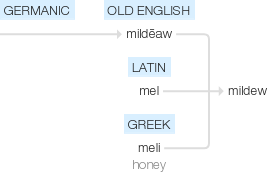Mildew
Old English mildēaw ‘honeydew’, of Germanic origin. The first element is related to Latin mel and Greek meli ‘honey’.
wiktionary
From Middle English mildewe, from Old English meledēaw, mildēaw, from Proto-West Germanic *milidauw, from *mili(“honey”) + *dauw(“dew”). Compare West Frisian moaldau, Dutch meeldauw, German Mehltau. More at dew.
etymonline
mildew (n.)
"minute parasitic fungus that appears on plants or decaying organic matter," mid-14c., a transferred sense of a word that meant originally "nectar, honeydew" (the sugar-rich sticky stuff secreted by aphids feeding on plant sap); this is from mid-13c. as mildeu, from Old English meledeaw, from a Proto-Germanic compound of *melith "honey" (from PIE root *melit- "honey") + *dawwaz "dew" (see dew). Similar formation in Old Saxon milidou, Dutch meeldauw, Old High German miltou, German Meltau "mildew." The first element in many continental Germanic languages has been assimilated to forms of meal (n.2) "ground grain."
As a kind of morbid fungus or blight, it presumably is so called from its being sticky and growing on plants. As a verb, "to taint with mildew," from 1550s. Related: Mildewed; mildewy.
